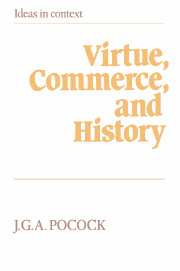 Virtue, Commerce, and History
Virtue, Commerce, and History Published online by Cambridge University Press: 05 May 2010
This essay begins by exploring the second part of its title and then enlarges upon some wider implications of the first. That is to say, I want in the first instance to consider Hume's perception of the crises in English and American politics that marked the last decade and a half of his life and were at a crescendo when he died; and I want to consider what doing so may tell us about his perception of the historical world he was about to leave. I have emphasized the words “English” and “American” in order to hint, by exclusion, at something already implied by the title: that Hume's view of the British world in disruption was very much a view from Edinburgh; and my concern will be with Hume as publicist, historian, and political theorist, prior to Hume as philosopher. From Hume's perception of the American Revolution, I shall turn in conclusion to say something about his role in the ideological history of that great event, one as replete with paradox as even Duncan Forbes could desire.
The thrust of this paper is historicist, in the sense that it emphasizes Hume's consciousness of history and of the moment in history that his individual life had occupied and was about to leave. Neither his historiography nor his philosophy is historicist in any of the principal senses that word was later created to express. But Hume was a historian as well as a philosopher and, in the former role as well as the latter, one of the greatest of his century.
To save this book to your Kindle, first ensure [email protected] is added to your Approved Personal Document E-mail List under your Personal Document Settings on the Manage Your Content and Devices page of your Amazon account. Then enter the ‘name’ part of your Kindle email address below. Find out more about saving to your Kindle.
Note you can select to save to either the @free.kindle.com or @kindle.com variations. ‘@free.kindle.com’ emails are free but can only be saved to your device when it is connected to wi-fi. ‘@kindle.com’ emails can be delivered even when you are not connected to wi-fi, but note that service fees apply.
Find out more about the Kindle Personal Document Service.
To save content items to your account, please confirm that you agree to abide by our usage policies. If this is the first time you use this feature, you will be asked to authorise Cambridge Core to connect with your account. Find out more about saving content to Dropbox.
To save content items to your account, please confirm that you agree to abide by our usage policies. If this is the first time you use this feature, you will be asked to authorise Cambridge Core to connect with your account. Find out more about saving content to Google Drive.